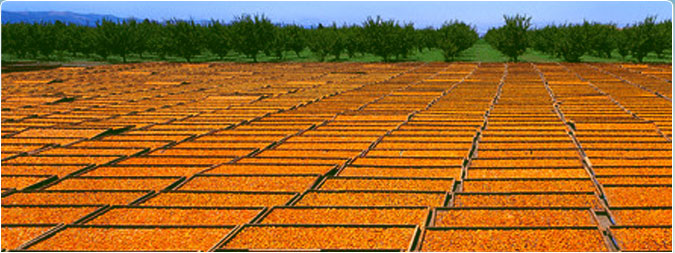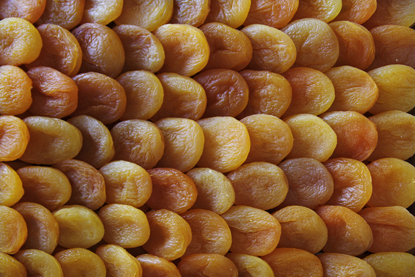|
|

Dried Apricots from Malatya region of Turkey
Turkey realizes 82% of the total dried apricot trade of the world. When we look at the world dried apricot production and export of dried apricot, it can be seen that Turkey is the leader without any serious competitors.
Apricot cultivation, which is spread in most of the agricultural regions of Turkey, finds its best environment in the province of Malatya. Due to the composition arising from the ecology of the province, Malatya origin apricots gained economic value in the form of dried apricots for years.

Turkish Dried Apricot from Malatya region, are famous because of the dry material content. While the dry material content of Malatya apricots vary between 24 % and 30 %, but other varieties was observed at only 20 %.
Classification of Turkish Dried Apricot : In Turkish Standards- TS 485, The two important quality criteria of dried apricots with regard to this standard are: moisture and SO2 contents, which should not exceed 25% and 2500ppm by weight respectively.The variety of Turkish sun dried apricots is Prunus armeniaca L. And called as "Sekerpare" .
Sulphured Dried Apricots; are treated with SO2 in order to provide colour retention and longer the shelf life .The colour of this type changes from light yellow to orange.The SO2 content is max 2000 ppm for European countries and between 2500-3000 for USA and others. Also if the buyer needs a special content iit can be adjusted as well.The colour is lighter as the SO2 content increases.
SO2 : 2500-3000 ppm
SO2 < 2000 ppm (for EU market)

Natural (Unsulphured) Dried Apricots; differs from sulphured apricots in colour ,the colour of this type changes from light brown to dark brown this is because these apricots are directly dried under the sunlight without being treated with SO2.
Harvest, Drying, and Packing of Dried Apricot
Harvest: Harvest time is determined with respect to the type of apricot, the altitude at which it is grown, due to the ripening, the getting yellow of its colour, its softening and getting sweet and juicy. The most suitable apricot harvest is made by hand, so the fruits are not damaged during harvest and they are harvested when sufficiently ripe. The other harvest types are that are done by shaking and flapping.
Drying: Apricot is dried for using two different methods, called "Gün kurusu" (natural dry), and "Kükürtleme" (sulfured dry). Sulfuring is useful to shorten the time of the drying process, to preserve the natural color, to prevent the product from getting infested with bugs, and to increase the preservation period. Sulfuring, and the rest accomplish more than 80 % of the total drying efforts by drying in the sun. Spreading the apricot directly on earth, concrete, or cloths does 10 % of the drying processes.
In natural drying, the quality decreases because of the dirt and bruises that the apricots receive. In apricots that are day dried, bugs form a short time after the drying process, but nevertheless, these apricots are very tasteful.
Selecting and Packing: Drying process is made by growers and farmers, and then these raw apricots are Selecting and Packing: Drying process is made by growers and farmers, and then these raw apricots are sold in the market to intermediaries. These merchants market the apricots to processor and packer companies. Packers companies first wash and fumigate these apricots, then calibrate to 8 different sizes, after these processes, apricots are waited in plastic baskets for 24 hours to absorb the excess water in it. After humidity and SO2 tests, if the product is conformed to official quality standards, handpicked by workers by one by one. All the wounded, damaged, dotted and mouldy berries are selected.
The final outcome is put into generally 5 or 12.5 kg bulk cartons, inside pp nylon or oil paper. In many of processing and packing houses, retail packs like 200, 250, 400, and 500gr is workable upon requests of buyers. These are white foam trays or clear cello bags
Dried apricot is generally consumed as:
1) Snacking
2) In Bakery (3-5mm or 7-9mm dice form is workable)
3) Confectionary
4) Compote
The Nourishing Value of Apricot and Its Benefits for Human Health
Through the organic and inorganic substances it contains, apricot affects human health positively. Apricot contains a large amount of sugar, starch, protein, pectin, pectose, cellulose, vitamins and acids; Apricot is very rich of the mineral potassium, and the vitamin ß carotene. Vitamin A is necessary for the health of the epithelium tissue surrounding the body and the organs, and for the health of the eye, for the health of bones and teeth, and for the functions of the endocrine glands. A diet of 200-250 grams of apricot contains sufficient oil and 1/3 of the necessary amount of vitamin A for one day. The property of apricot about being poor in sodium and rich in potassium may help the arrangement of some special diets. Sodium and potassium is necessary for the osmotic pressure and the acid-base equilibrium of the body fluids. Sodium accumulation in the body leads to edemas.
Insufficiency of potassium leads to insufficiency of glycogen. Apricot can conveniently be used in diets where sodium is restricted, for example in diets for congestive cardiac insufficiency, in renal illnesses, in hematite cirrhosis where, acid accumulates, and excess in the diets for persons having long times of carticosteroide therapy.
Nutrition Information (100 gr.) |
Energy |
267 kcal (1117 kJ) |
Protein |
3,1 g |
Carbohydrate |
62,8 g |
Fat |
0,48 g |
|
|
MINERALS |
Calcium |
67 mg |
Iron |
5,5 mg |
Magnesium |
62 mg |
Phosphorus |
108 mg |
Sodium |
26 mg |
Potassium |
979 |
|
|
VITAMINS |
A (IU / ug) |
10,900 (IU) |
B1 |
0,01 mg |
B2 |
0,16 mg |
B3 |
3,3 mg |
C |
12 mg |
The Benefits of Apricot
1. Helps brain functions, decreases stress
2. Heals the damaged part of liver
3. Is useful for bones
4. Is useful against anemia
5. Prevents ulcer formation, and helps the healing of ulcers
6. Decreases the formation of kidney stones
7. Increases sexual power
8. Has a protecting effect against cancer
9. Helps teeth to be stronger and healthier
10. Strengthens the cardiac muscles and helps them to function
smoothly, thus is effective in the heart's ability to recover during the reanimation efforts in a clinic death, if the person has eaten
apricot a sufficient time before the event.
11. It's very important in human nourishment because it is rich
in potassium, and in carotene, and poor in sod
|